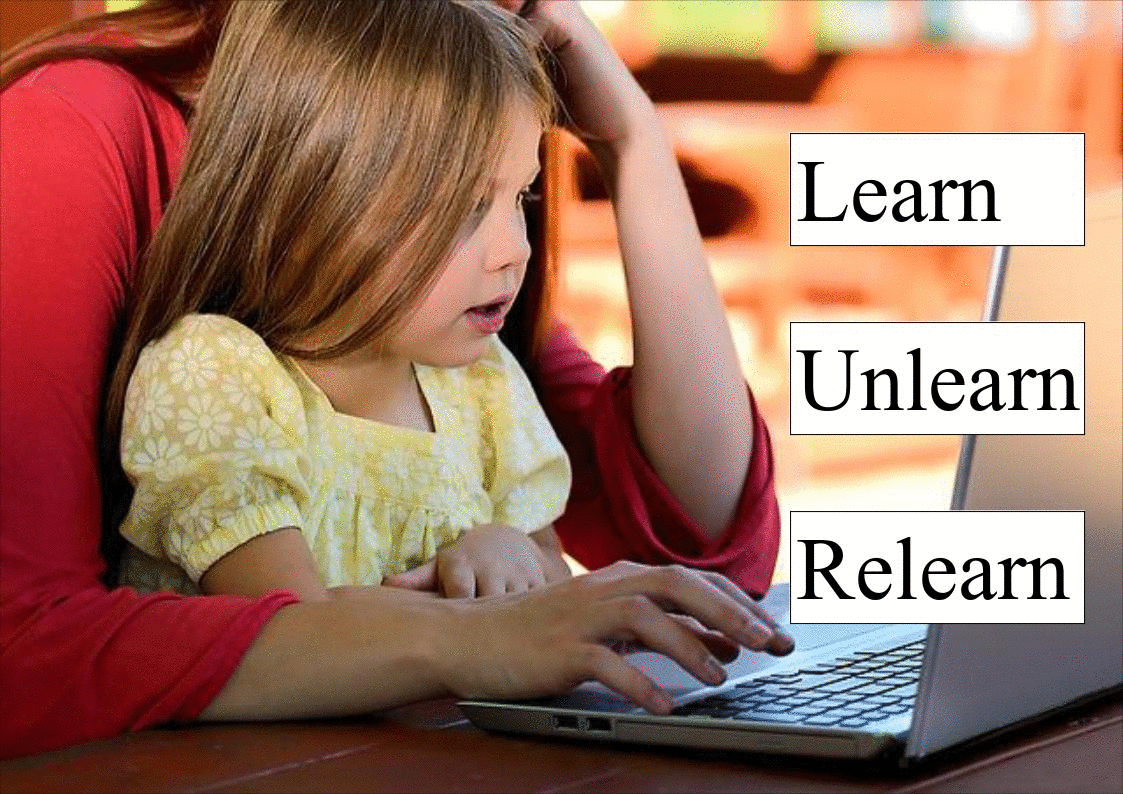Learn, Unlearn, and Relearn

Learning starts from the moment of birth.
A newborn baby comes out of the mother's womb with an apriori knowledge that it has to suck milk to live. It instinctively learns how to suck its mother's breasts.
A baby tries to experience everything by sucking. It sucks its own fingers. It sucks the small toys. It then learns to test every little object by its tongue and mouth.
A baby stops testing an object with its mouth only when an object gives a lousy test. When it grows up, it learns to stop sucking every real-world thing.
It unlearns to suck milk from its mother's breast and learns to eat/drink other foods and drinks.
In adult life, all humans and non-human animals learn, unlearn, and relearn many essential elements in due courses of life grindings.
Unlearning starts when we falter.
In real life, learning is natural. We learn many things in life without any formal training. We learn to walk and run. We learn to swim in the water.
New factory workers may unknowingly touch a heated machine part and get burned in their palms. The next time the worker does any activity on the machine, they won't touch the machine parts with bare hands.
In many cases, unlearning a well-practiced process becomes a little bit challenging. Giving up a process learned and practised for many months and years is not at all an easy task.
For example, a country kid who learns swimming without a trained coach may find it hard to give up a rough hand and leg movements inside water while executing a specific swimming style.
Unlearning follows relearning.
Suppose a folk singer who is well practiced with a particular style of voice throw. When the folk singer is introduced to learning classical vocals, it may take many days and months to adapt to a different voice throw and singing.
The first step is to temporarily give up the already adapted style of doing a job/craft or unlearning the old style of doing the job/craft.
The second step is relearning the new style of the job/craft.
The final step is repeatedly exercising the new process of the job/craft.
Unlearning and relearning are associated with dedicated practice of the job/craft. That means exercising the new process of the job/craft repeatedly without fail.
When to permanently unlearn some job/craft?
For example, suppose a person learned a defective fingering technique in playing a stringed musical instrument, such as a guitar or sitar.
When the fellow came to an expert Guru for advanced lessons, the Guru detected the defects in the fellow's faulty fingering techniques.
Here, the learner must practice hard to unlearn the faulty fingering techniques that he/she practiced in the early learning years.
Although it would be very difficult to give up the faulty fingering techniques and relearn the correct ones from the expert Guru.
It is an example of where and why a person may need to permanently unlearn a wrong or faulty method or knowledge from their learning memory.
I experienced a similar situation with my fingering in playing the Indian percussion instrument tabla. I could detect my defects during my high school days when a senior tabla teacher kindly taught me the correct fingering.
Unlearning bad and worse habits MUST be permanent. There is no about it.
Concluding thoughts
Learning, unlearning, and relearning are essential for every life.
Learning a new job or a craft ask for dedication from the learner.
Learning is natural and entertaining.
Unlearning is not as easy and natural as learning a new job/craft.
Relearning is even more challenging than learning a new job/craft from scratch.
Unlearning requires a great deal of tenacity to give up a long-time habit, acquired knowledge, and skills.
Relearning ask for the daunting challenge of doing a job/craft in a new way.
Postscript
Let me give an example of "learning, unlearning, and relearning" from my little computing life.
I was introduced to computing on mainframe computers in the university environment in the 1980s.
I started to learn about computing and computers.
It was associated with typing each line of the code on a punching card, submitting the program jobs to the computer center, and collecting the output afterward.
Gradually, IBM-compatible desktop computers arrived, and I was introduced to Microsoft Disk Operating System or DOS, followed by Microsoft Windows 95, etc.
I unlearned punch cards and learned to write computer programs on floppy disks and hard disks.
I decided to unlearn (give up) everything about Microsoft and proprietary software and relearn computing myself with GNU/Linux, free and open source software (FOSS), in 1999.
I baptized (relearned) myself to GNU/Linux and FOSS.
Now, I never use a single piece of proprietary software on my computers.
My entire technology life is propelled by GNU/Linux and FOSS.
What are your experiences?
What learning, unlearning, and relearning processes do you take in your life?
I would love to hear your stories.
{Sponsor information of this article}

Image Source TheGuy – Follow him on Noise and Hive for more insights.
Cheers!
Unity (Debesh Choudhury)
Text Copyright © 2022 Debesh Choudhury — All Rights Reserved
Join me at
Odysee, LinkedIn, Twitter, noise.cash, read.cash, publish0x, and Facebook
Lead Image: I created a GIF with my title texts and a modified Image by Chuck Underwood from Pixabay.
All other images are either drawn/created/screenshots by myself or credited to the respective artists/sources.
Disclaimer: All texts are mine and original. Any similarity and resemblance to any other content are purely accidental. The article is not advice for life, career, business, or investment. Do your research before adopting any options.
Unite and Empower Humanity.
#learn #unlearn #relearn #knowledge #life
Nov 30, 2022

That is is true, where unlearning is tough process there the relearning is even more tough. We nice and beautiful topic.